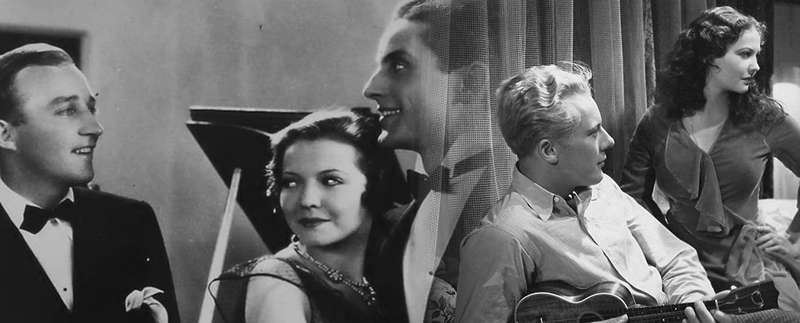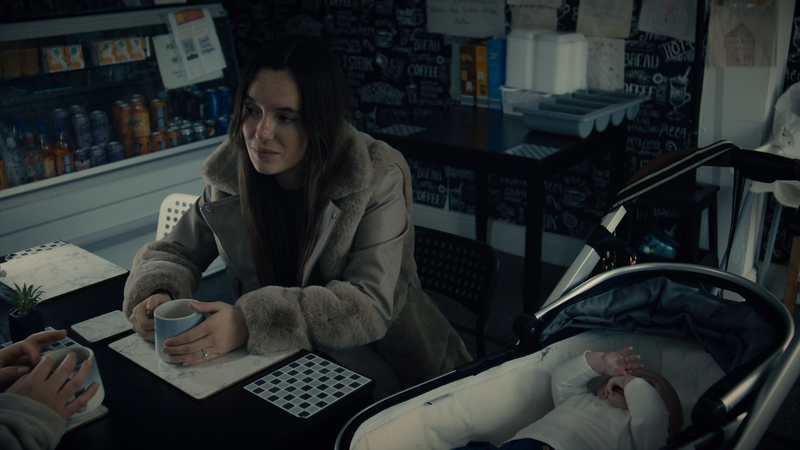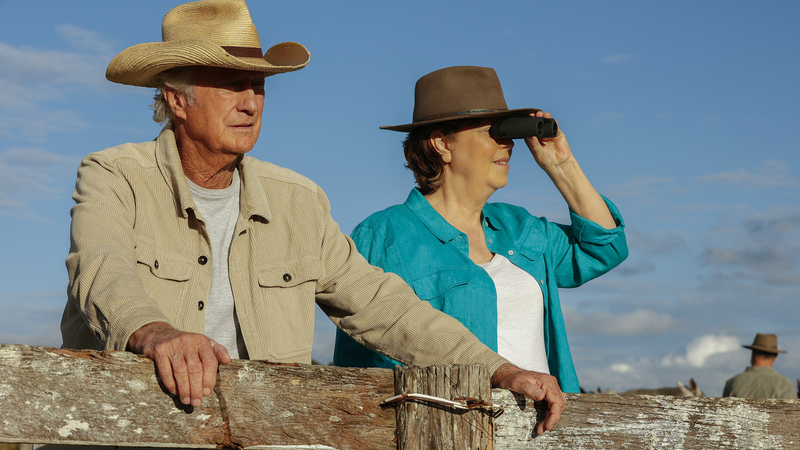
Before the Code Cracked Down, These Stories Broke Loose
MOVIE REVIEW
Pre-Code Classics [Confessions of a Coed | Ladies of the Big House] (Blu-ray)
–
/
Genre: Pre-Code, Drama, Crime, Mystery, Romance
Year Released: 1931, Kino Lorber Blu-ray 2025
Runtime: 2h 31m
Director(s): David Burton, Dudley Murphy, Marion Gering
Writer(s): Ernest Booth, Louis Weitzenkorn, William Slavens McNutt
Cast: Sylvia Sidney, Phillips Holmes, Gene Raymond, Norman Foster, Wynne Gibson, Claudia Dell, Earle Foxe, Florence Britton, Rockliffe Fellowes, Martha Sleeper, Purnell Pratt
Where to Watch: available August 12, 2025. Pre-order your copy here: www.kinolorber.com or www.amazon.com
RAVING REVIEW: Some home video releases arrive and serve as simple preservation projects; others feel like a chance to step into a time capsule. Kino Lorber’s Pre-Code Classics [CONFESSIONS OF A CO-ED | LADIES OF THE BIG HOUSE] is firmly in the latter category, resurrecting two early-1930s Paramount melodramas with all the forbidden allure of pre-Code Hollywood. Both star a radiant, still-rising Sylvia Sidney and showcase just how far studio storytellers could push the boundaries before the Production Code began tightening its grip. Viewed together, they not only highlight Sidney’s remarkable screen presence but also reveal two sides of the same coin — scandal in collegiate halls and desperation behind prison bars.
CONFESSIONS OF A CO-ED
The first feature, directed by David Burton and Dudley Murphy, is a curious hybrid of morality with a salacious undercurrent. Told partly through the pages of Patricia Harper’s diary, the story traces a young woman’s whirlwind romance, an unplanned pregnancy, and a marriage of convenience that spirals into a love triangle. Phillips Holmes and Norman Foster play the men vying for her heart, though their characters carry the sort of flaws that would never be spelled out in the dialogue but are obvious in implication.
Pre-Code touches abound — unchaperoned parties, thinly veiled discussions of sex, and a willingness to portray an unwed mother without total condemnation. Bing Crosby and the Rhythm Boys even drop in for an early screen appearance, providing a novelty moment that now plays as an archival treasure. At 75 minutes, the pacing is brisk, but it doesn’t always find a balance; one moment flirts with risqué comedy, the next feels like a stern morality play. The absence of actual classroom life or academic detail leaves the college setting feeling more like a social playground, yet that also reinforces the film’s preoccupation with romance, status, and gender expectations. Sidney carries it through sheer force of charisma, selling even the script’s uneven transitions with expressive precision.
LADIES OF THE BIG HOUSE
If the first film trades in collegiate scandal, the second delivers high-stakes melodrama behind bars. Directed by Marion Gering, LADIES OF THE BIG HOUSE pairs Sidney with Gene Raymond as newlyweds wrongfully convicted of murder — he’s sent to death row, she’s sent to the women’s prison. It’s a setup rooted in contrivance, but the execution is surprisingly strong, with the plot moving from courtroom injustice to survival among inmates, culminating in desperate attempts to clear their names.
What’s striking here is the absence of the usual lurid tropes that later defined many women’s prison films. The inmates aren’t uniformly portrayed as sadists or caricatures; instead, the script gives room for moments of solidarity and kindness. Louise Beavers, in a performance far ahead of its time, plays a warm, supportive fellow inmate whose humanity quietly undercuts period stereotypes. Wynne Gibson provides a counterpoint as an antagonistic prisoner, adding texture to the internal prison drama. On the men’s side, Raymond’s scenes on death row are staged with an economy that still conveys dread, aided by Rockliffe Fellowes’ affecting turn as a doomed fellow inmate.
Gering’s direction is more adventurous than the earlier film’s straightforward staging, employing tight close-ups, dramatic angles, and sequences that feel daring for 1931. While some logic falters under scrutiny, the emotional through-line works, anchored by Sidney’s ability to oscillate between vulnerability and resolve.
Together, these films make a compelling case for Sidney’s versatility. In CONFESSIONS OF A CO-ED, she is the conflicted ingénue navigating romantic and societal pressures; in LADIES OF THE BIG HOUSE, she is the wronged heroine fighting to survive in a system stacked against her. Kino Lorber’s Blu-ray presentation brings unexpected sharpness and contrast to these nearly century-old prints, revealing detail in costumes, sets, and even facial expressions that would have been muted in older transfers.
The included audio commentaries by David Del Valle and Stan Shaffer provide valuable insight, particularly for viewers interested in pre-Code sensibilities, Paramount’s studio style, and the careers of the performers. Context matters here: both films were released just before the full enforcement of the Production Code, a period when Hollywood tested how far it could go with themes of sexuality, injustice, and moral ambiguity. Without that context, it’s easy to miss how unusual some of these moments were meant to be for mainstream American cinema at the time.
Neither film is flawless. CONFESSIONS suffers from inconsistency and a tendency to gloss over its moral complications, while LADIES leans heavily on coincidence to drive its plot. Yet both have a directness in their emotion that makes them engaging even now. They also share an archival fascination — glimpses of Bing Crosby before superstardom, Jane Darwell in an unbilled role, early roles by actors who would go on to long careers.
For modern audiences, the set works best as both entertainment and a history lesson. It invites comparisons between how scandal, justice, and gender were portrayed before Hollywood sanitized such material. Sidney’s performances, still immediate after nearly a hundred years, provide the connective tissue that elevates the set beyond simple nostalgia.
Kino Lorber has packaged these two rarities into a release that preserves their flavor while presenting them in the best condition they’ve likely been seen since their theatrical runs. For pre-Code enthusiasts, classic film scholars, or anyone curious about Hollywood’s early-’30s output, this is a needed addition to the shelf. More than just a showcase for Sylvia Sidney, it’s a reminder of the transitional moment in American cinema — when the rules were still being written, and occasionally broken in plain sight.
Please visit https://linktr.ee/overlyhonestr for more reviews.
You can follow me on Letterboxd, Instagram, Twitter, and YouTube. My social media accounts can also be found on most platforms by searching for 'Overly Honest Reviews'.
I’m always happy to hear from my readers; please don't hesitate to say hello or send me any questions about movies.
[photo courtesy of KINO LORBER]
DISCLAIMER:
At Overly Honest Movie Reviews, we value honesty and transparency. Occasionally, we receive complimentary items for review, including DVDs, Blu-rays, CDs, Vinyl Records, Books, and more. We assure you that these arrangements do not influence our reviews, as we are committed to providing unbiased and sincere evaluations. We aim to help you make informed entertainment choices regardless of our relationship with distributors or producers.
Amazon Affiliate Links:
Additionally, this site contains Amazon affiliate links. If you purchase through these links, we may receive a commission. This affiliate arrangement does not affect our commitment to honest reviews and helps support our site. We appreciate your trust and support in navigating these links.



Average Rating